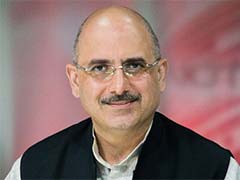(Nalin S Kohli is spokesperson for the Bharatiya Janata Party (BJP) and Director of the party’s Public Policy Research Centre. He is also a lawyer and has extensive experience in media and education.)
In 1974, Roti, Kapda aur Makaan, a film that went on to become a hit, highlighted on celluloid the primary needs of every human being. 67 years after independence, millions of Indians still suffer the ignominy of lack of access to food, clothing and permanent housing. Even if there is access to food, it should be edible.
In a civilized society, good conduct is expected from all citizens, even more so from those who occupy high offices or are elected representatives of the people. Citizens often look unto their representatives as role models. Hence, any incident that displays a lack of civility on part of eminent persons can be expected to cause public outrage. That the quality of food being served at the Maharashtra Sadan was a matter of concern and even consternation was no secret. Residents staying there were known to prefer eating elsewhere. Discontent was brewing. In trying to prove a point, a Member of Parliament is said to have tried to forcibly feed an employee to prove his point about the quality of food being served.
Regrettably, the incident has also offered an opportunity for many parties of the pseudo secular brigade, in particular the Congress, to pitch in their condemnation. Some Congress party spokespersons have gone as far as to consider it “against the Constitution” and against their brand of “secularism”.
Article 25 (1) of the Constitution of India expressly states that “Subject to public order, morality and health and to other provisions of this Part, all persons are equally entitled to freedom of conscience and the right freely to profess, practice and propagate religion.” Every Indian irrespective of the faith they practice, enjoys the freedom to do so. Any impediment to this cannot be permitted. Be it a Hindu who seeks to visit the holy cave of Amarnath in the month of Shravan, disruption or impediments in either case is not acceptable.
Unfortunately, pseudo-secularists are quick on the draw in the Maharashtra Sadan incident but many choose to remain silent when the Amarnath Yatra sees violence in any form. India is a secular country despite this brand of selective secularism. Indians by vast majority are secular and inclusive in their outlook. They have been so for thousands of years, much before the Constitution was brought into existence on 26th January 1950. Lessons on secularism cannot be selective.
SOURCE: NDTV






